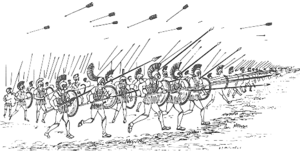 The Corinthian War that lasted from 395 BC to 387 BC was one of the most recounted battle in the history of ancient Greece, and the whole world as well. It refers to the war between Sparta, a city-state in Greece known for its formidable military power, against four other allied states: Argos, Athens, Corinth and Thebes.
The Corinthian War that lasted from 395 BC to 387 BC was one of the most recounted battle in the history of ancient Greece, and the whole world as well. It refers to the war between Sparta, a city-state in Greece known for its formidable military power, against four other allied states: Argos, Athens, Corinth and Thebes.
The cause of the Corinthian War was believed to be envy and the growing threat of Sparta in claiming territories, which alarmed the four allied states. Before this war, Sparta emerged victorious in the Peloponnesian War against Athens, whose some territorial domains were transferred to Sparta.

The conspiracy against Sparta was sealed when Pharnabazus, the “satrap” or governor of Lydia, sent a Greek soldier Timocrates of Rhodes to bribe the major mainland Greek cities to rise in arms against Sparta. The initial fighting came as a conflict between the Theban ally Locrian versus the Spartan ally Phocian. In this war, Athens supported Thebes. By 395 BC, the states of Corinth and Argos supported Thebes and Athens.
The Corinthian War was a grand battle on both land and sea. On land, the Spartans emerged victorious, while at sea, they were defeated. Athens specifically sought to strengthen its empire by reclaiming its old island territories and greatly expanded its naval force. The Persian empire which supported the allied states soon became alarmed over Athenian expansion and defected its support to Sparta. The Persian King Artaxerxes and the Spartan commander Antalcidas met in Susa and agreed to end the war.
To persuade Athens to stop its fleet, the Spartans threatened to control Athenian trade routes which it already did before, damaging Athenian trade. Athens agreed, and Thebes, Corinth, and Argos soon followed. In 387 BC, the Peace of Antalcidas or the “King’s Peace” was signed, signifying an end to the Corinthian War.
The treaty outlined Persia’s control in the Ionian Empire while the other Greek cities would be free and independent. Sparta was relegated into the role of the “Grecian peacekeeper.”